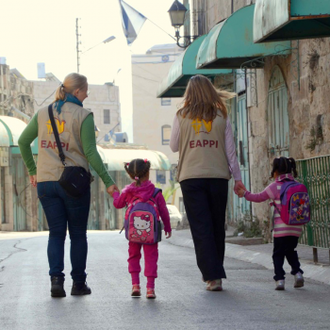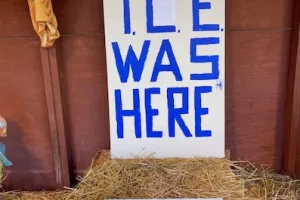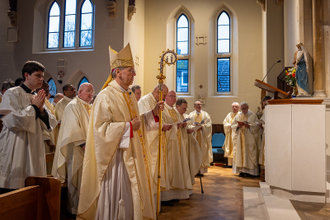Holy Land eyewitness: Settlers do what they want with impunity

EA volunteers escort children to school in Hebron
Source: Ecumenical Accompaniers
Tariq* and his father Obaid* were woken by loud banging on the door and bright lights just after midnight. Fifteen Israeli Border Police and two ordinary police were outside. They stated that some agricultural tools had been stolen from a nearby Israeli settlement two weeks earlier. Tariq protested that there was no evidence provided by the police for this claim and no search warrant. The police response, said Tariq, was to take his camera and phone and physically abuse him. Tariq tells us that the police told him 'they can do what they want'. Obaid and a neighbour were arrested on suspicion of stealing the tools. They were taken to a nearby Israeli police post, and were released only after paying 500 Shekels (about £120) each, and promising to return to court to answer the charges in 2020.
According to locals and EAs on the ground, this is the latest in a pattern of arbitrary arrests and incursions in this small community in the South Hebron Hills. 110 Palestinians live here, alongside Israeli settlements, which are Israeli-only housing units in the West Bank. They are illegal under international law. There is a continuous Israeli military presence on the ground, which the government of Israel states is necessary for the security of all. However, many Palestinians say that the military only provide protection for the Israeli settlers and not for them.
Israeli human rights NGO, B'Tselem, and many EA's report that there have been numerous attacks, and harassment of Palestinian shepherds over the years from settlers. EA's have described how settlers frequently harass shepherds while they are grazing their sheep. They often come along, accompanied by the Israeli military and tell the shepherds to leave their fields. If the shepherds refuse, they risk being arrested by the accompanying soldiers. There are frequent military and police incursions into the village, unsettling adults and frightening children, creating an atmosphere of fear, uncertainty and tension.
The village where Tariq and Obaid live is very isolated, because the obvious route to it from the main road, a 20-minute walk away, runs close to a nearby Israeli settlement of 560 people. Many Palestinians have experienced violence from this settlement and say it is too dangerous for them to use this road. As a result, villagers take a dusty 'roundabout' route which means a two-hour walk for them.
Villagers and EA's say that children from this village are frequently attacked or harassed on their walk to school near to the settlement. In response, the Israeli military committed to escort the children on the path between these settlements, but EAs and partner organisations have reported that they do not come every day, and they often do not escort the children all the way.
As well as insufficient security against violence and harassment from settlers, Palestinians in the occupied West Bank have little legal protection. Crimes against them often go unpunished, whilst crimes they are accused of, regardless of the evidence presented, almost always lead to conviction.
According to B'Tselem, "settler violence has long since become part of Palestinians' daily life under occupation. Israeli security forces enable these actions, which result in Palestinians casualties - injuries and fatalities - as well as damage to land and property. In some cases, they even serve as an armed escort, or even join in the attacks. Investigations, if even opened, are usually closed with no action taken against perpetrators as part of an undeclared policy of leniency. The long-term effect of this violence is the dispossession of Palestinians from increasing parts of the West Bank, making it easier for Israel to take over land and resources."
The result of Tariq's trial remains to be seen, but the lack of access to legal justice for Palestinians under Israeli occupation is a continuous cause for concern. Israeli settlers live under civil law securing their right to due processes, such a fair trial and legal representation. Palestinians are trailed by Israeli soldiers, under military law, with few human rights provisions and a 99.7% conviction rate.
However difficult the circumstances, villagers are keen to remain where they are and carry on farming and their traditional way of life. People under military occupation should be humanely treated and protected against acts of violence or threats, the loss of property, and arbitrary deprivation of liberty according the 4th Geneva Convention and International Humanitarian Law Rule 99.
Take action
Read what the UN has to say about the Israeli settlements across the West Bank: www.ochaopt.org/theme/humanitarian-impact-of-settlements
Please write to your elected representatives, asking them to halt their construction of illegal settlements and to put an end to the two-tier legal system, ensuring all Palestinians have adequate security and legal protection.
*Not their real names
LINKS
Ecumenical Accompaniment Programme in Palestine and Israel - http://eappi.org/en
Short presentation EAPPI - www.facebook.com/EAPPI.WCC/videos/791798477825619/


















